|
|
|
Sort Order |
|
|
|
Items / Page
|
|
|
|
|
|
|
| Srl | Item |
| 1 |
ID:
106362
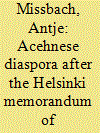

|
|
|
|
|
| Publication |
2011.
|
| Summary/Abstract |
This article sheds light on how the Acehnese diaspora adapted to the Memorandum of Understanding (MoU), a peace deal signed between the Indonesian government and the Gerakan Aceh Merdeka (Free Aceh Movement, GAM) after almost 30 years of small-scale war in Aceh. Analysing diasporic responses requires taking two sites into consideration: the host countries where Acehnese diasporans reside and the homeland, to which diasporans return and engage in local politics. Spontaneous and temporary return decreased the Acehnese diaspora significantly in numbers and this decline correlated with a loss of impact on homeland politics. Unlike in conflict times, the homeland no longer requires their involvement. Most remaining diasporans adjust to the loss of significance by transforming their collective activities to suit their new and more limited opportunities. Rather than long-distance politics they focus on identity politics to nurture their Acehneseness abroad. However, at the same time, the process of de-diasporisation is accompanied by a subtle wave of political re-diasporisation. Since the conflict in Aceh was the main rationale for the diasporisation of the Acehnese overseas, the end of conflict now threatens the diasporic cohesion. In order to save not only the notion of togetherness, but also the diaspora's reputation as a spearhead for Aceh's independence, a few diasporans continue to dedicate their activities to this separatist cause.
|
|
|
|
|
|
|
|
|
|
|
|
|
|
|
|
| 2 |
ID:
120033
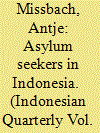

|
|
|
| 3 |
ID:
166685
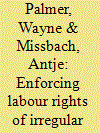

|
|
|
|
|
| Summary/Abstract |
The multi-directional nature of labour migration flows has resulted in an increasing number of countries having become both senders and receivers of regular and irregular migrants. However, some countries continue to see themselves primarily as senders and so ignore their role as a receiving country, which can have negative implications for the rights of migrants in their territory. Using the example of Indonesia, which is State Party to the 1990 UN Convention on the Rights of All Migrant Workers and Their Families, this article demonstrates that irregular migrant workers in this country have the legal right to protection against labour exploitation even when they work despite the government’s prohibition on employment. The article discusses the ‘right to work’ and how international human rights law has translated it into the ‘right to protection from labour exploitation’ for irregular migrants in Indonesia. By way of two case studies about the Indonesian government’s handling of irregular migrants, it shows how it prioritises enforcement of the employment immigration law over labour and employment laws much like countries that have not ratified the ICRMW. It also draws attention to legal protection gaps that emerge for asylum seekers when they are recognised to be genuine refugees.
|
|
|
|
|
|
|
|
|
|
|
|
|
|
|
|
| 4 |
ID:
176234
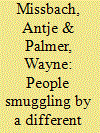

|
|
|
|
|
| Summary/Abstract |
The decline in the smuggling of people from Indonesia to Australia since late 2013 is primarily attributable to unilateral deterrence policies under Australia's Operation Sovereign Borders. When seeking to prevent asylum seekers from coming to Australia to enjoy the right to asylum there, the Australian government has tested a number of deterrent mechanisms that sometimes border on illegality and even state crime. In May 2015, for example, Australian authorities intercepted an Indonesian boat carrying 65 asylum seekers and allegedly paid the six smugglers to return their passengers to Indonesia. In this article, we reconstruct what happened at sea, and put forward a number of arguments that categorise this ‘turnback’ as explicitly-commissioned people smuggling against Indonesia. Our article also points to further implications about looming risks if the policy was to be employed more widely by states in other areas of the world where people cross the sea to seek asylum. Not only would the practice severely undermine international collaborations that have developed to prevent and combat people smuggling, but it would also create additional safety risks for those who are turned back.
|
|
|
|
|
|
|
|
|
|
|
|
|
|
|
|
| 5 |
ID:
149170
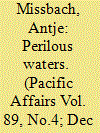

|
|
|
|
|
| Summary/Abstract |
Recent research has found that since 2001 a disproportionate number of Indonesian offenders sentenced to jail for people smuggling, both in Indonesia and Australia, are fishermen from Eastern Indonesia, the poorest part of the country.2 Based on three field trips to the Eastern Indonesian island of Rote, a frequent departure point for asylum seekers to Australia, and semi-structured interviews, this article investigates the socio-economic backgrounds of sentenced offenders from this area to explain their high numbers amongst imprisoned people smugglers. Through the narratives of fishermen who have been involved in the transport of asylum seekers, this article seeks to reconstruct their decision-making and risk-taking strategies in light of their generally precarious lives. Their motivations to become involved in people issue_images_89_4_missbach_rote-island-2smuggling are correlated with two structural problems they face, overfishing and pollution, which have exacerbated their economic situation over the last years. Understanding the local structural constraints of these impoverished fishermen helps provide a clearer understanding of why and how transnational people-smuggling networks succeed in recruiting them. Rather than viewing the decision to become involved in people smuggling as an individual’s poor judgement and its negative outcome as self-inflicted misery, this article stresses the notion of collective hyper-precariousness, which is enhanced by extrinsic factors such as Australian policies that have further limited the meagre choices for making a living legally on Rote
|
|
|
|
|
|
|
|
|
|
|
|
|
|
|
|
| 6 |
ID:
106351
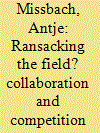

|
|
|
|
|
| Publication |
2011.
|
| Summary/Abstract |
After the end of almost thirty years of armed conflict in 2005 and following a devastating tsunami in 2004, Aceh has become a "social laboratory" for foreign researchers who study Indonesia's northern-most province from every angle. Over the last five years, this effort has resulted in the publication of a considerable number of articles in major journals. For some foreign researchers, Aceh became a fast track accelerating their careers. Yet, how much did local Acehnese researchers benefit from being at the center of this scholarly attention, and how much were they able to participate in academic debates? To answer these questions, this article examines the involvement of Acehnese scholars in the process of knowledge production in and about contemporary Aceh. One of the key findings is that local researchers are often involved in data collection, but left out from its analysis and interpretation due to a general lack of structural conditions for publishing, such as under-funding, lack of access to major academic literature, and language barriers. Embedding this inquiry about research cooperation and competition in wider debates about representation and academic development support, this article stresses critical evaluations of current academic ventures. Moreover, Aceh as a post-conflict/tsunami site illustrates the enormous difficulties that developing countries such as Indonesia face in tertiary education and academic research. Long-standing structural imbalances responsible for uneven research outcomes cannot disappear overnight or only as a result of foreign educational initiatives. Nevertheless, this article introduces a specific example of short-term academic collaboration named Aceh Research Training Institute (ARTI)-a flicker of hope in an otherwise rather unpromising situation.
|
|
|
|
|
|
|
|
|
|
|
|
|
|
|
|
| 7 |
ID:
147940
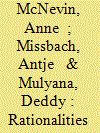

|
|
|
|
|
| Summary/Abstract |
This article examines an Australian-funded counter-smuggling campaign delivered in Indonesia from 2009 to 2014 as an example of the global regulatory regime known as Migration Management. Drawing on fieldwork conducted in Indonesia among the fishing communities targeted by the campaign, we problematize the campaign’s purported success. The appearance of success, we argue, is linked to four interrelated rationalities of governance—security, humanitarianism, managerialism, and colonialism—that shape the terms of reference through which the campaign was conceived, designed, and evaluated. These rationalities “make sense” of a campaign that can otherwise be read as indicative of circular and misdirected strategies of border security. In a second move, we show how the techniques deployed in the campaign give rise to challenges to technocratic control. We argue, by extension, that Migration Management is subject to subtle disruptions and subversions that emanate from the very rationalities through which it is sustained. Our argument exposes the politics at stake in a regulatory regime that is represented as neutral and of benefit to all. It also shows what stands in the way of template reproduction of the Management agenda.
|
|
|
|
|
|
|
|
|
|
|
|
|
|
|
|
|
|
|
|
|